Cats do several curious behaviors, and their sleeping positions never disappoint to entertain.
It is not unusual to see a cat sleep with its head tucked upside down, leaving owners wondering how it could be a comfortable position.
However, cats sleeping with their heads upside down is quite common, especially when there is a tight bond with their owner.
Cats will sleep with their heads upside down to stay warm, have a restful sleep, feel safe, or feel comfortable. Your cat may also sleep like this to heighten its sense of smell while sleeping.
If you notice your cat sleeping in this position, it could indicate your cat fully trusts you. A cat may also sleep in several other positions, which could indicate trust.
You may notice cats sleeping on their back or to their side, which exposes their stomachs, leaving them vulnerable.
In the wild, cats typically do not sleep upside down on their head because it limits the sounds they can hear.
Having a reduced sense of hearing, especially in the wild, can make a cat susceptible to an attack from a predator.
What Are Possible Reasons For Sleeping Upside Down?
Many cat owners have observed their cats sleeping upside down, but why do cats prefer this unusual sleeping position?
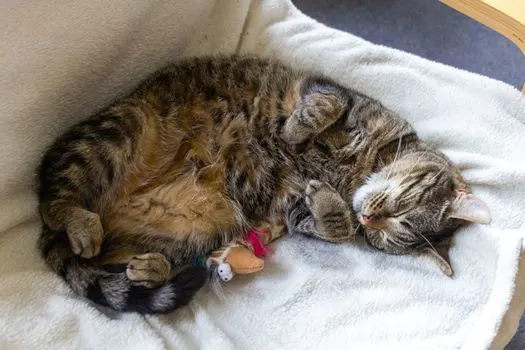 There may be several reasons for a cat to sleep like this. Some reasons include the following:
There may be several reasons for a cat to sleep like this. Some reasons include the following:
- Warmth – Cats are heat-seeking animals and do almost anything to stay warm. The skin that makes up a cat’s ears is fragile, making it a prime area for cats to lose body heat. Sleeping on the head helps to keep the ears insulated, which may help keep your cat warm.
- Safety – Sleeping with the head turned upside down covers the eyes and the ears. In the wild, cats never sleep in this position because it leaves the cats vulnerable. At home, though, your cat feels safe and comfortable and will sleep in this position to relax fully and let you know it trusts you as an owner.
- Comfort – Cats are incredibly flexible and can contort their bodies into several positions. Sleeping with the head turned upside down helps relieve pressure from the head, allowing the body and muscles to relax fully. This position keeps the body light as a feather, allowing your cat to fall into a restful sleep.
- Smell – The nose is fully exposed when the head is turned upside down. While this sleeping position may reduce your cat’s hearing ability, it can, in fact, heighten your cat’s sense of smell. Your cat may prefer to sleep like this to constantly smell your presence in the room, assuring your cat that it is safe to fall asleep.
- Rest – When your cat sleeps with its head upright, it is still alerted to every sound in your home. Sleeping with its head upside down may be a way for your cat to block out sounds and distractions, ensuring a restful night’s sleep.
Is A Cat Sleeping Upside Down A Sign Of Trust?
Seeing your cat sleeping with its head upside down could indicate that your cat trusts you. When your cat sleeps with its head turned, the ears are pinned against the floor.
If your cat’s ears are pinned, they cannot hear as well as they usually would.
This sleeping position could indicate that your cat trusts its surroundings, including yourself, feeling content and protected enough to sleep without worrying about potential dangers in the home.
Do Cats In The Wild Sleep Upside Down?
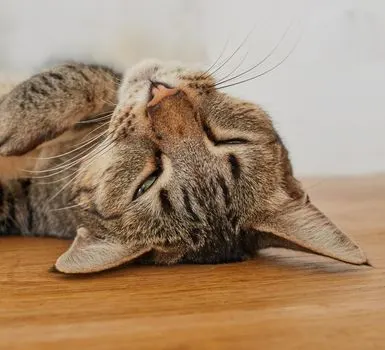 In the wild, larger predators can hunt cats and must always stay aware and alert. It is not common to see a wild cat sleeping with its head upside down.
In the wild, larger predators can hunt cats and must always stay aware and alert. It is not common to see a wild cat sleeping with its head upside down.
When a cat sleeps upside down, its ears are pinned back, limiting the sounds the cat can detect. If a predator approaches, a cat in the wild may not get away in time.
Instead, wild cats will choose to find a safe, protected, and secluded place to sleep. Usually, a cat will find a secure den where it is protected on all sides.
Typically, a wild cat will rest with its head upright to still be aware of sounds an approaching predator may make.
How Can I Make My Cat More Comfortable At Home?
Although sleeping in an upside-down position is a sure sign that your cat is comfortable and trusting, there are ways that you can bolster your cat’s comfort even more.
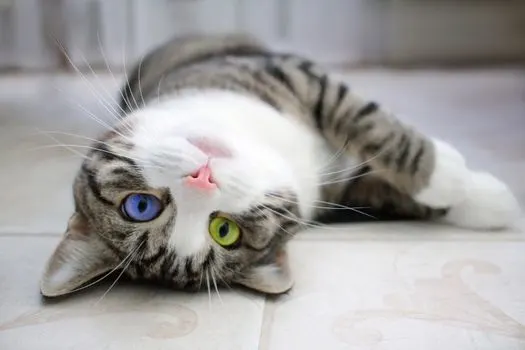 Some of the best ways to make your cat feel more comfortable at home include:
Some of the best ways to make your cat feel more comfortable at home include:
- Perches – Give your cat plenty of places throughout your home where your cat can perch from a high vantage point. Not only does this give your cat a chance to survey your home and quietly observe, but it helps give your cat a special place to call its own.
- Box – In the wild, cats like to find a tight den to curl up to sleep to feel safe. Domestic cats are no different and want to sleep in a confined area. Adding a bed or a box is the perfect way to help your cat feel even more comfortable.
- Treats – Treats are a great way to associate a positive experience with your cat. Food can help motivate your cat or build trust.
- Playtime – Interactive play with your cat is one of the easiest ways to build a strong connection with your pet. Playtime is fun, and exciting and requires your cat to think and adapt to changing conditions. If your cat is willing to expose itself during play, it is a sure sign that your cat is becoming more comfortable.
- Feeding – Cats love dinner time and form a strong connection with food. Knowing that your cat has a steady and consistent meal is the best way to make it feel comfortable. Be sure to feed your cat regularly, guaranteeing your cat forms a trusted bond with you.
What Are Other Popular Cat Sleeping Positions?
Finding a cat sleeping upside down on its head can indicate a happy, comfortable, and trusting cat. However, cats are sleeping masters and can contort into various sleeping positions.
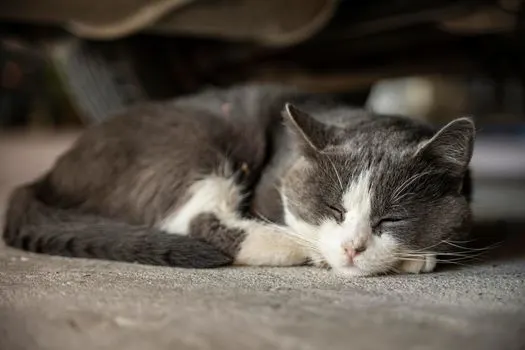 Some of the most common ways to find your cat sleeping include:
Some of the most common ways to find your cat sleeping include:
- Belly Up – Finding your cat sleeping on its back with its belly up can show that it is trusting. Sleeping in this position exposes the most vulnerable part of the cat, so your cat deeply trusts you and feels safe.
- Curled Up – Often, animals will sleep curled into a ball as a way to save both energy and warmth. Your cat may try to stay warm by forming a tight ball to sleep.
- Sideways – Your cat may also choose to sleep on its side, with its legs outstretched. This sleeping position also indicates trust since the vulnerable stomach is still exposed.
- Loaf – Cats have some pretty entertaining sleeping positions, but the loaf is crowd favorite. Your cat will look like it is just seated but has its legs tucked underneath the body. Usually, a cat will adopt this sleeping style if dozing off for a quick nap.
- Eyes Covered – Cats sometimes use a paw to cover their eyes while sleeping. Although animal behaviorists say this isn’t a conscious position, they may instinctively cover their eyes to prevent the sun from entering their eyes.
- Box – It is hard to separate a cat from its favorite sleeping box. Giving your cat a bed or a box to sleep in helps your cat feel comfortable and safe. Feeling a secure barrier on all sides helps ease your cat’s mind, allowing it to fall into a restful sleep.
Related Questions
How can you tell if your cat trusts you?
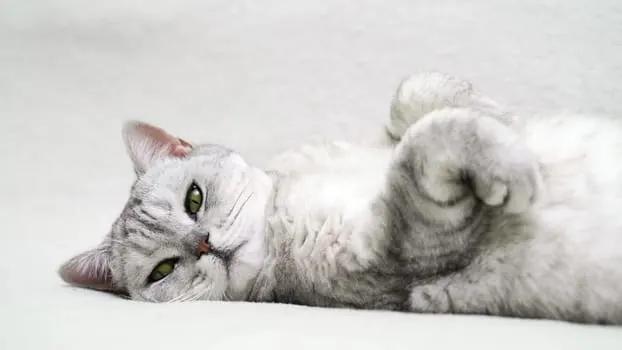 Cats have a bad reputation for being fickle animals but can become bonded to their owners. If you are observant, you may notice your cat’s sure signs to show that they truly trust you.
Cats have a bad reputation for being fickle animals but can become bonded to their owners. If you are observant, you may notice your cat’s sure signs to show that they truly trust you.
Aside from sleeping upside down with its head turned, your cat may also:
- Roll onto its back and present its belly
- Slow blink while making eye contact with you
- Rub along your legs while walking
- Knead in your lap or next to you
- Cat is bringing you small “gifts.”
- Closing their eyes or sleeping near you
How much does a cat sleep in a day?
In the wild, cats use a great deal of energy to pursue and catch their prey. They’ll spend a significant amount of the day sleeping to restore their energy.
Although your domestic cat doesn’t have to hunt for food, it still inherits the tendency to sleep for long hours daily.
On average, a domestic cat sleeps about 16 to 20 hours daily. You may notice that your pet cat is more active at night, especially when a kitten.
As your pet ages, it will sleep significantly more throughout the day.
Our team is composed of pet care professionals, veterinarians, and pet owners. To date, we’ve conducted thousands of hours of research to publish the most accurate pet information.
Most of the writers on our site are vets with 10+ years of clinical experience, ranging from small practice, to equine practice, academia, and surgery. Our goal is to help every pet owner get the information they seek about their dear companions.

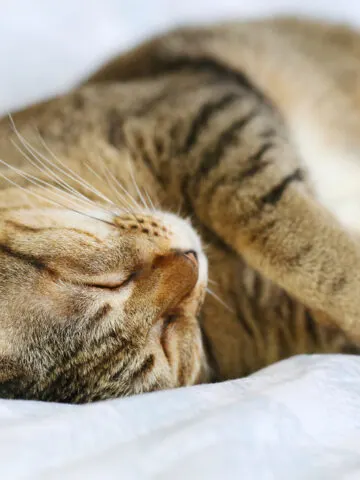

Leave a comment
You must be logged in to post a comment.